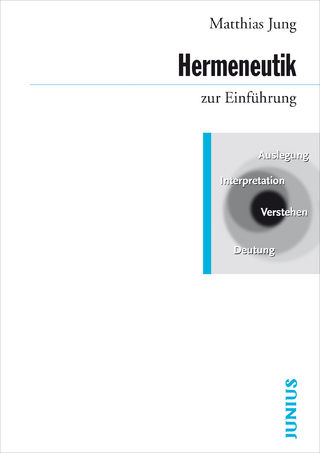Approaching Infinity
Palgrave Macmillan (Verlag)
978-1-137-56085-8 (ISBN)
The book addresses the need for a theory of infinity, and reviews both old and new theories of infinity.
Approaching Infinity addresses seventeen paradoxes of the infinite, most of which have no generally accepted solutions. The book addresses these paradoxes using a new theory of infinity, which entails that an infinite series is uncompletable when it requires something to possess an infinite intensive magnitude. Along the way, the author addresses the nature of numbers, sets, geometric points, and related matters.
The book addresses the need for a theory of infinity, and reviews both old and new theories of infinity. It discussing the purposes of studying infinity and the troubles with traditional approaches to the problem, and concludes by offering a solution to some existing paradoxes.
Michael Huemer received a B.A. from UC Berkeley and a Ph.D. from Rutgers University. He is presently a full professor at the University of Colorado, where he has taught since 1998. He has published three single-author scholarly books, one edited anthology, and more than fifty academic articles in epistemology, ethics, political philosophy, and metaphysics. His articles have appeared in such journals as the Philosophical Review, Mind, the Journal of Philosophy, Ethics, and others. Michael's first book, Skepticism and the Veil of Perception, significantly advanced the theory of Phenomenal Conservatism in epistemology, which is now considered one of the leading theories of justified belief and is the focus of the recent anthology, Seemings and Justification (Oxford, 2013). His second book, Ethical Intuitionism, is one of the leading contemporary defenses of ethical intuitionism and of moral realism more generally. It has been assigned as course reading by two colleagues at my own university, in addition to philosophers at the University of Massachusetts at Amherst, Lafayette College, Huron University College, Syracuse University, and Princeton University. It was the subject of a book symposium in Philosophy and Phenomenological Research. Michael's most recent book, The Problem of Political Authority, was published in 2013.
List of Figures
Preface
PART I: THE NEED FOR A THEORY OF INFINITY
1. The Prevalence of the Infinite
1.1. The Concept of Infinity and the Infinite
1.2. The Infinite in Mathematics
1.3. The Infinite in Philosophy
1.4. The Infinite in the Physical World
1.5. The Infinite in Modern Physics
1.6. Controversies
2. Six Infinite Regresses
2.1. The Regress of Causes
2.2. The Regress of Reasons
2.3. The Regress of Forms
2.4. The Regress of Resemblances
2.5. The Regress of Temporal Series
2.6. The Regress of Truths
2.7. Conclusion
3. Seventeen Paradoxes of the Infinite
3.1. A Word about Paradoxes
3.2. The Arithmetic of Infinity
3.3. The Paradox of Geometric Points
3.4. Infinite Sums
3.5. Galileo's Paradox
3.6. Hilbert's Hotel
3.7. Gabriel's Horn
3.8. Smullyan's Infinite Rod
3.9. Zeno's Paradox
3.10. The Divided Stick
3.11. Thomson's Lamp
3.12. The Littlewood-Ross Banker
3.13. Benardete's Paradox
3.14. Laraudogoitia's Marbles
3.15. The Spaceship
3.16. The Saint Petersburg Paradox
3.17. The Martingale Betting System
3.18. The Delayed Heaven Paradox
3.19. Conclusion
PART II: OLD THEORIES OF INFINITY
4. Impossible Infinite Series: Two False Accounts
4.1. 'An Infinite Series Cannot Be Completed by Successive Synthesis'
4.2. 'An Infinite Series of Preconditions Cannot Be Satisfied'
4.3. Conclusion
5. Actual and Potential Infinities
5.1. The Theory of Potential Infinity
5.2. Why Not Actual Infinities?
5.3. Infinite Divisibility
5.4. Infinite Time
5.5. Infinite Space
5.6. Infinitely Numerous Numbers
5.7. Infinitely Numerous Abstract Objects
5.8. Infinitely Numerous Physical Objects
5.9. Conclusion
6. The Cantorian Orthodoxy
6.1. The Importance of Georg Cantor
6.2. Sets
6.3. Cardinal Numbers
6.4. 'Greater', 'Less', and 'Equal'
6.5. Many Sets Are Equally Numerous
6.6. The Diagonalization Argument
6.7. Cantor's Theorem
6.8. The Paradoxes of Set Theory
6.9. Other Paradoxes of Infinity
6.10. Conclusion
PART III: A NEW THEORY OF INFINITY AND RELATED MATTERS
7. Philosophical Preliminaries
7.1. Metapreliminaries
7.2. Phenomenal Conservatism
7.3. Synthetic A Priori Knowledge
7.4. Metaphysical Possibility
7.5. Possibility and Paradox
7.6. A Realist View of Mathematics
8. Sets
8.1. Sets Are Not Collections
8.2. Sets Are Not Defined by the Axioms
8.3. Many Regarded as One: The Foundational Sin?
8.4. The Significance of the Paradoxes
8.5. Are Numbers Sets?
8.6. Set Theory and the Laws of Arithmetic
9. Numbers
9.1. Cardinal Numbers as Properties
9.2. Frege's Objection
9.3. Arithmetical Operations
9.4. The Laws of Arithmetic
9.5. Zero
9.6. A Digression on Large Numbers
9.7. Magnitudes and Real Numbers
9.8. Indexing Uses of Numbers
9.9. OtherNumbers
10. Infinity
10.1. Infinity Is Not a Number
10.2. Infinite Cardinalities
10.3. Infinite Extensive Magnitudes
10.4. Infinite Intensive Magnitudes
10.5. Some A Priori Physics
11. Space
11.1. Pointy Space Versus Gunky Space
11.2. The Unimaginability of Points
11.3. The Zero Argument
11.4. When Zero Is Not Mere Absence
11.5. The Paradox of Contact
11.6. The Problem of Division
11.7. The Dimensionality of Space Is Necessary
11.8. The Measure-Theoretic Objection
12. Some Paradoxes Mostly Resolved
12.1. The Arithmetic of Infinity
12.2. The Paradox of Geometric Points
12.3. Infinite Sums
12.4. Galileo's Paradox
12.5. Hilbert's Hotel
12.6. Gabriel's Horn
12.7. Smullyan's Infinite Rod
12.8. Zeno's Paradox
12.9. The Divided Stick
12.10. Thomson's Lamp
12.11. The Littlewood-Ross Banker
12.12. Benardete's Paradox
12.13. Laraudogoitia's Marbles
12.14. The Spaceship
12.15. The Saint Petersburg Paradox
12.16. The Martingale Betting System
12.17. The Delayed Heaven Paradox
12.18. Comment: Shallow and Deep Impossibilities
13. Assessing Infinite Regress Arguments
13.1. The Problem of Identifying Vicious Regresses
13.2. Viciousness through Metaphysical Impossibility
13.3. Viciousness through Implausibility
13.4. Viciousness through Explanatory Failure
13.5. Conclusion
14. Conclusion
14.1. Why Study Infinity?
14.2. Troubles with Traditional Approaches
14.3. A New Approach to Infinity
14.4. Some Controversial Views about Sets, Numbers, and Points
14.5. Solving the Paradoxes
14.6. For Further Reflection, or: What Is Wrong with this Book?
| Erscheinungsdatum | 31.01.2016 |
|---|---|
| Zusatzinfo | XIII, 275 p. |
| Verlagsort | Basingstoke |
| Sprache | englisch |
| Maße | 140 x 216 mm |
| Themenwelt | Geisteswissenschaften ► Philosophie ► Allgemeines / Lexika |
| Geisteswissenschaften ► Philosophie ► Logik | |
| Geisteswissenschaften ► Philosophie ► Metaphysik / Ontologie | |
| Mathematik / Informatik ► Mathematik | |
| Naturwissenschaften | |
| ISBN-10 | 1-137-56085-1 / 1137560851 |
| ISBN-13 | 978-1-137-56085-8 / 9781137560858 |
| Zustand | Neuware |
| Informationen gemäß Produktsicherheitsverordnung (GPSR) | |
| Haben Sie eine Frage zum Produkt? |
aus dem Bereich




